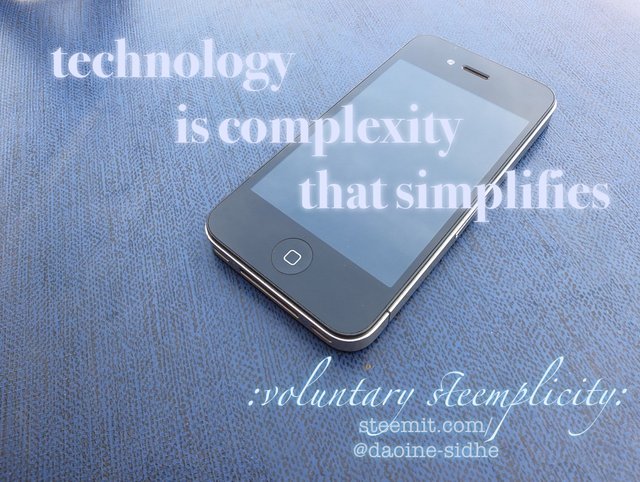TECHNOLOGY : voluntary steemplicity : part 4 :

Choosing simplicity doesn't mean I'm a luddite.
Proponents of voluntary simplicity are often accused of being luddites, people opposed to technology. It's not hard to see why; some of us advocate living off-grid and and many of us refuse to buy into the consumer culture of perpetually "newfangled" products. But most of us want to make life easier, not harder, which rejecting technology would inevitably do. What you'll generally see in the world of voluntary simplicity isn't a rejection of technology itself, but only of damaging technology. Most of us recognize that technology can enhance a simple life.
Today, let's look at technology.
The term "luddite" comes from Ned Ludd, a 16th Century worker who, according to folklore, broke several knitting machines in a fit of rage, angry that these machines were threatening his job as a weaver. A decade or two later, protestors in England destroyed factory machines to protest the same type of threat to their jobs. These protestors, who were dubbed "Luddites," weren't worried about living a more simple life. They were worried about job security.
My interest in voluntary simplicity stops short of neo-luddism. I love technology, and you probably do, too, if you're reading this online, having accessed the decentralized social media platform known as Steemit. Our very participation here is an homage to technology.
And the main reason I'm not a luddite is because I'm familiar with the work of a French economist named Frédéric Bastiat. In 1845 he first pointed out that machines compete with employees who perform the same job by hand. So before anything else, we need to own up to the fact that luddism is a reaction to competition. A bad reaction. A temper tantrum. If I reject innovation and technology by defining it as a "job killer," I'm rejecting competition, and all the positive effects it brings. That's not unusual. People have always been tempted to avoid competition because it pushes us to be better, faster, kinder, smarter, and more efficient. And competition brought about by innovation forces us to adapt to a new world, something we are constantly being forced to do.
But Bastiat wasn't done. He then pointed out that, when a machine wins out in that competition and replaces a worker, we only see the immediate effects of that. We ignore the long-term effects. The knitting machine makes it possible to create socks with less time and effort. This lowers the price of socks. And the people who are now spending less on socks can spend more on something else. This creates new demand in areas it didn't exist before, when people had to spend that money on socks. That new demand creates jobs. Bastiat showed that jobs are only displaced by new inventions, they're not destroyed or even diminished.
Jobs are only displaced by new technology, they're not destroyed or even diminished.
And just like the knitting machines did back in 1589, technology still offers to make our lives simpler today. I can store reams of documents digitally. I'm old enough to have owned a four-drawer filing cabinet full of paper copies of important information. I now keep all of this on a few jump drives in a desk drawer. This might be threatening to paper manufacturing, but remember, innovation creates more jobs opportunities than it destroys. The computer industry has dwarfed the paper manufacturing industry in the wealth it brings to our economy. (And don't forget, paper was once a technological innovation, itself, helping us dispense with those clunky stone tablets.)
My cell phone offers me instantaneous information about my loved ones, at any given time. And there are some really cool cell phone health apps that actually lessen the time and effort used in making a diagnosis. I learned about the world of voluntary simplicity on my computer, accessing stores of information about it on the internet. That's where I learned how to clean without chemicals, reduce clutter, cook from scratch, and grow herbs without Monsanto's "help." Sure, I might reject chemical pesticides, but that's for health reasons, not a fear of technology.
Blockchain technology is bringing the same issues up, all over again. Neo-luddism is already rearing its ugly head, but this time it's not in defense of weaving or fast-food jobs. It's focusing on corporate banking jobs that will likely be made obsolete by blockchain and crypto technologies. In the process, blockchain will eventually eradicate the banking fraud that caused the financial crisis of 2008 (and many others for centuries before that).
Peter Todd, who writes for Bitcoin Core, sees the threat of job displacement as progress forward: “All this blockchain stuff is really about: How good can we make the security to get to the point where we can imagine getting rid of human beings?” Todd was quoted in Bitcoin Magazine, in an article entitled, Blockchain Technology Could Put Bank Auditors Out of Work. But blockchain technology has already created more jobs in our economy than it will ever destroy in the banking and financial sector. And beyond that, this technology will provide us more opportunities to create wealth, rather than just mere jobs. Steemit is the perfect example of that.
For more info on the neo-luddite reaction to blockchain technology, read our own @sterlinluxan in his piece, Against the Luddite Mentality: An Ode to Technology and Capitalism that he wrote for bitcoin.com back in January.

This is exactly the way to share economic truths - by couching them in the terms of other fields of interest. Most VSers probably wouldn't click on a post about employment statistics or Schumpeter's creative destruction, but they very possibly could click on this, and learn something in the process.